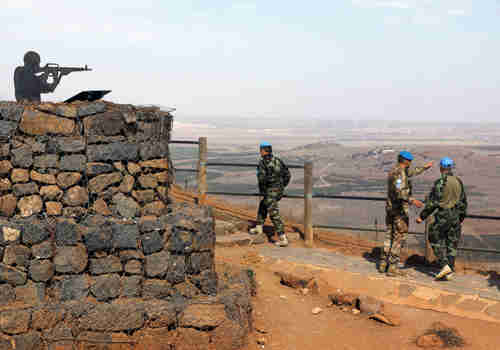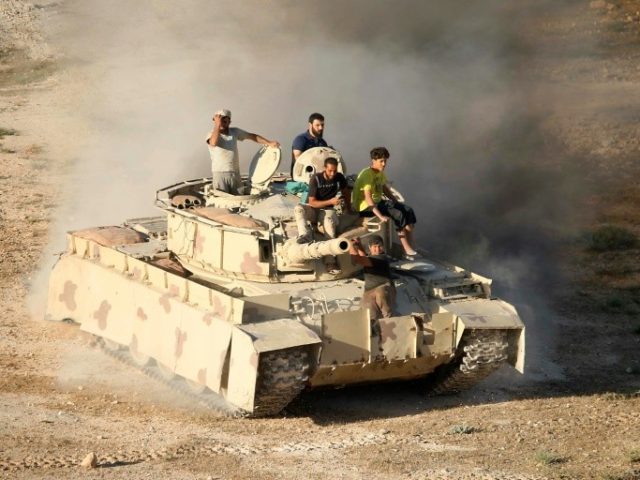This morning’s key headlines from GenerationalDynamics.com
- Russian bombers join Syrian military assaulting Daraa province
- Jordan says it cannot host a new wave of refugees from Syria
- Concerns grow in Israel over Syrian and Russian assaults on Daraa and Quneitra provinces
Russian bombers join Syrian military assaulting Daraa province

U.N. peacekeepers patrol Mount Bental, an observation post in the Golan Heights near the ceasefire line between Israel and Syria, October 23, 2017. (Reuters)
As we reported three days ago, the regime of Syria’s president Bashar al-Assad has begun an assault on the southwestern province Daraa, which is on the border with Jordan.
There is also an expectation that it will soon be followed by another assault, this time on the southwestern province Quneitra, which is on the border with Israel-controlled Golan Heights.
On Saturday overnight, Russian warplanes joined the effort and began bombing towns in Daraa with dozens of airstrikes. The warplanes had apparently come from the Russian-operated Hmeimim airbase in coastal Syria.
The attacks on Daraa are violations of the “de-escalation zones” agreement, based on last year’s peace talks in Astana, Kazakhstan. The peace talks were between Russia, Iran, and Turkey, but they always were a big joke, to be used as a cover for Shia/Alawite al-Assad to continue his genocide and ethnic cleansing of Sunni civilians in Syria. The agreement named four de-escalation zones where there were supposed to be ceasefires, but Syria and Russia never had any intention of honoring the ceasefire and would resume ethnic cleansing as soon as it was convenient to do so.
The ceasefire in each zone would be overseen by one nation and, apparently, the U.S. became the overseer for the southwestern zone, because nobody wanted to trust any Syrian, Iranian, or Russian forces near the border with Israel.
So now that Syria and Russia have thoroughly violated the other de-escalation zones, it is the turn of the southwestern de-escalation zone. The U.S. State Department last week threatened “serious repercussions” for violation of the de-escalation zone, without specifying what those repercussions might be. However, on Sunday, the U.S. sent a message to Syrian rebel factions that they should not expect U.S. military support, and “you should not base your decisions on the assumption or expectation of a military intervention by us.” Whether that represents a brand new example of the U.S. setting a red line and then refusing to enforce it is up to the perception of the observer. Times of Israel and Al-Arabiya (Riyadh) and Middle East Eye
Jordan says it cannot host a new wave of refugees from Syria
Daraa province lies along the border with Jordan and there have already been reports last week that tens of thousands of people are fleeing the violence, running south into Jordan to escape the bombing.
However, Jordan on Sunday said that is unable to host a new wave of Syrian refugees. According to the United Nations, some 650,000 Syrian refugees have registered with them in Jordan since the Syrian war began seven years ago. Jordan itself estimates the actual number is closer to 1.3 million people and says it has spent more than $10 billion hosting them.
Jordan’s government spokesman Jumana Ghanimat said on Sunday:
The large number of Syrians we’re hosting in terms of financial resources and infrastructure does not allow for the reception of a new wave of asylum seekers
Jordan has not and will not abandon its humanitarian role and its commitment to international charters, but it has exceeded its ability to absorb (more refugees). Everyone should cooperate to deal with any new wave of displacement within Syria’s borders.
She added that Jordan would work with “concerned organisations” to find an arrangement for the displaced inside Syria. Middle East Eye and Al-Arabiya (Riyadh)
Concerns grow in Israel over Syrian and Russian assaults on Daraa and Quneitra provinces
Although the full-scale assaults by Syrian and Russian forces on Daraa province have not yet reached Quneitra province, which is on the border with Israel-controlled Golan Heights, it is expected that they will do so soon.
In anticipation of artillery and airstrikes in Quneitra, thousands of Syrians have fled villages to makeshift camps near the border with Israel. It is believed that Syrian artillery will avoid shelling near the border to avoid provoking a military response by Israel.
There are supposed to be peacekeeping forces inside Syria along the border with Israel. This was set up in 1974 following the 1973 Yom Kippur war. The United Nations Disengagement Observer Force (UNDOF) would have 1,250 peacekeepers.
Following the outbreak of the Syrian civil war in 2011, and after a contingent of 22 peacekeepers from the Philippines were kidnapped and held for three days by a group affiliated with Islamic State in 2013, much of the UNDOF contingent moved to the Israeli side of the border, where they have been less effective. With tensions growing on the Syrian side of the border, Israel has requested that they move back to that side, but they are reluctant to do so.
During the last few days, Syrian forces have taken control of an abandoned United Nations peacekeeping post in the no-man’s land between the Israeli and Syrian areas of the Golan Heights. The post, abandoned by UNDOF troops on the Golan, is meant to be free of both Israeli and Syrian troops, according to the cessation of hostilities agreement between the two countries that followed the 1973 Yom Kippur War. UNDOF has identified ongoing infrastructure work at the site.
In addition to a renewed military threat from Syrian forces, and possible Iranian or Hezbollah forces embedded within them, there’s also the possibility of thousands of Syrian refugees crossing the border into Israel, just as is happening along the border with Jordan. Reuters and Jerusalem Post and Times of Israel and United Nations Disengagement Observer Force (UNDOF)
Related Articles:
- Thousands of Syrians flee into Jordan to escape bombing in Daraa (22-Jun-2018)
- Russia, Iran, Turkey sign farcical Syria peace agreement (25-Jan-2017)
- Russia, Iran and Turkey announce yet another farcical new Syria peace plan (09-May-2017)
- Farcical Syria peace process ‘proximity talks’ to begin this week in Geneva (25-Jan-2016)
- Investigation reveals depraved new atrocities by Syria’s Bashar al-Assad (08-Feb-2017)
KEYS: Generational Dynamics, Syria, Bashar al-Assad, Russia, Daraa Province, Quneitra Province, Golan Heights, Hmeimim airbase, de-escalation zones, Israel, Iran, Turkey, Russia, Astana, Kazakhstan, Jordan, Jumana Ghanimat, Yom Kippur War, United Nations Disengagement Observer Force, UNDOF, Philippines, Hezbollah
Permanent web link to this article
Receive daily World View columns by e-mail

COMMENTS
Please let us know if you're having issues with commenting.